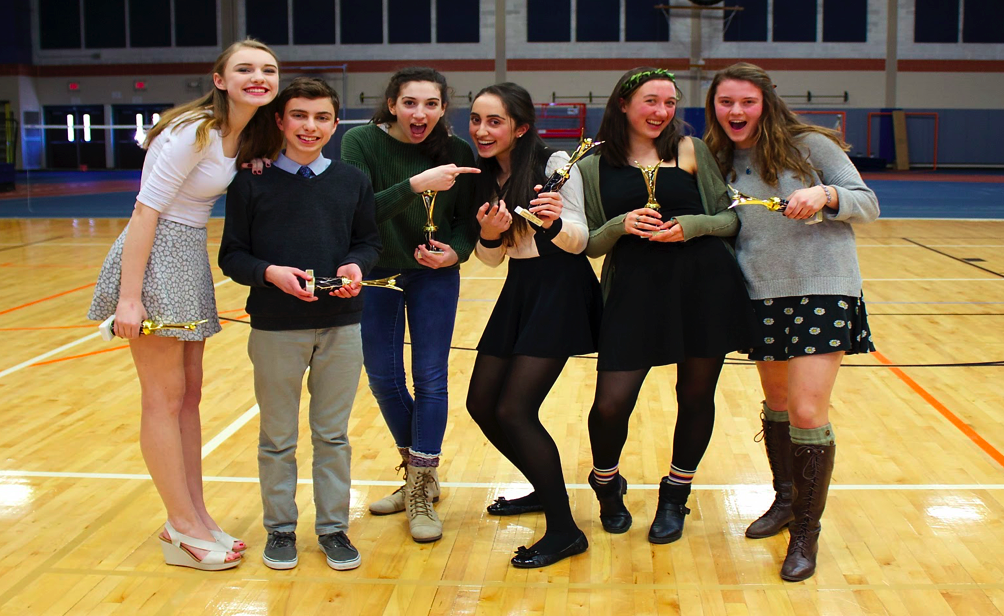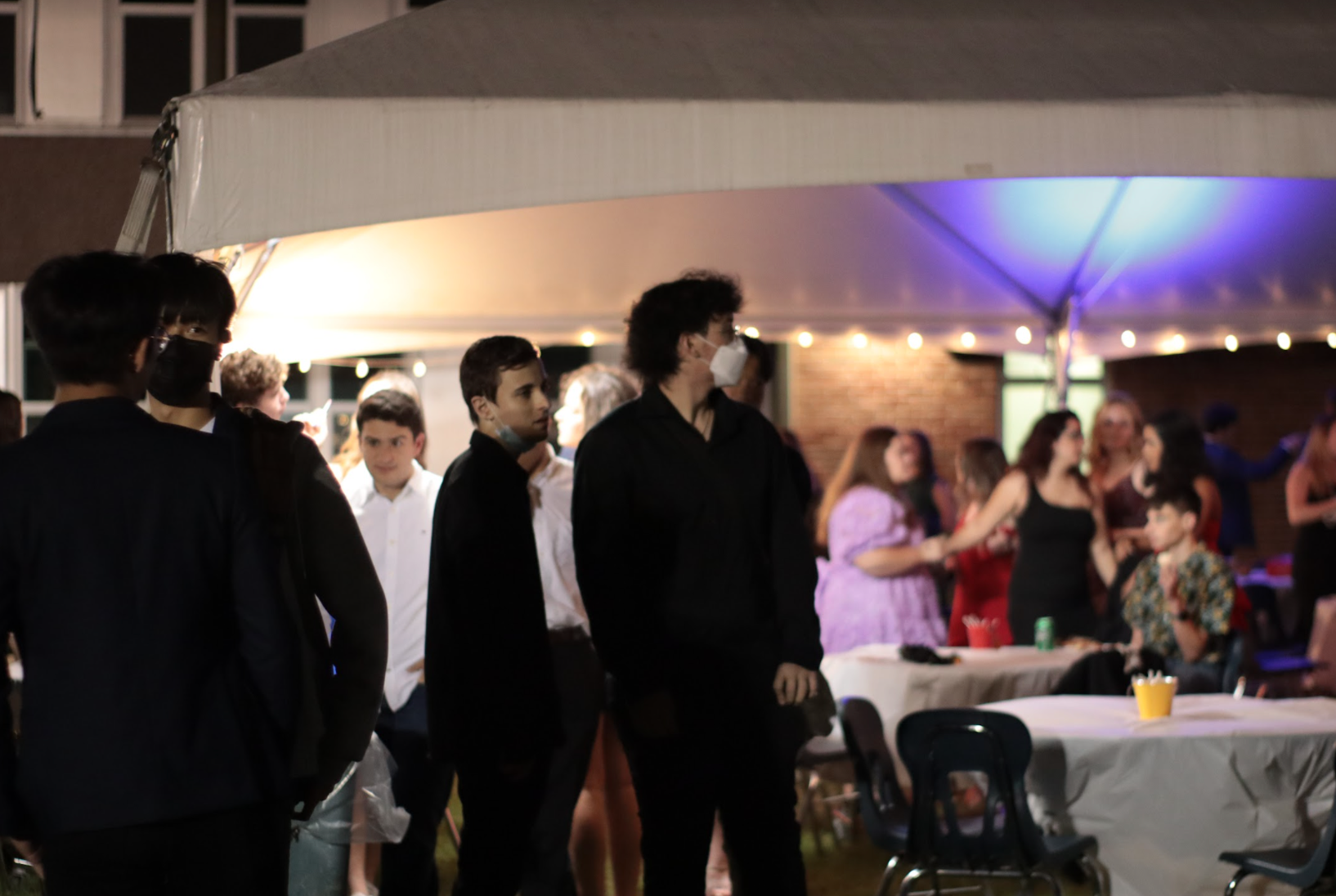Photograph by Lucy Kim
Sophomore Speech Finalists
By Noy Alon and Lucy Kim
News Reporters
Kimia Tabatabaei – “You Deserve to Know the Truth”
Kimia Tabatabaei won this year’s sophomore speech contest by discussing the detrimental effects of mass media distortion, and how it conveys inaccurate information.
Tabatabaei was inspired after listening to the abstract and inaccurate statements from the news stations.
“I was listening to the news one day and I was like, wow, this is completely false and I don’t agree with anything they’re saying, and they’re making make a big statement about people that isn’t accurate,” Tabatabaei said.
After realizing these fallacies, Tabatabaei decided to connect her frustration with the media to her interest of generalizations, and ultimately landed on how mass media generalizations are detrimental to our democracy.
Tabatabaei’s English teacher, Kelly Henderson, explains that Tabatabaei’s passion about multiple topics and her thorough research ultimately led to her success.
“She [Tabatabaei] was battering around a bunch of different ideas because, like I said she is passionate about so much and so by the time she landed on this final draft she had done a ton of work,” Henderson said.
The trial and error process that led to Tabatabaei’s success elevated her speech and paved the way for a more promising performance, due to her extensive research.
Tabatabaei admits, however, that the first classroom presentation was very stressful and intimidating, but with practice she became more comfortable and at ease with her speech, especially during semi-finals and finals.
“I already presented it the first time, so I just thought to myself that I know the topic better than anyone else because I’ve done so much research on it and I tried to like harness all the confidence I could,” Tabatabaei said.
Henderson explains how impressed she was not only with Tabatabaei’s confidence, but also her polished demeanor during the classroom presentation.
“She is the definition of poise, and so when she presented it to the class, of course my teacher heart is exploding with joy because she just totally nailed it, and I didn’t have the ability to predict that it was going to go that well,” Henderson said.
Tabatabaei’s grace enabled her message to convince her classmates of the impact of mass media distortion and made for an effective speech.
Her ultimate goal was to bring awareness to a problem she felt the majority of the students were unaware of and to ensure that we will not allow the news to jeopardize how we view the world.
“I am obviously not saying to not listen to the news at all, but just be careful about what you are hearing and if you want to quote something make sure that it is true . . . from different sources,” Tabatabaei said.
Overall, Tabatabaei is hopeful that her message and ideas grasped the necessary attention and is also grateful for her and her fellow finalists’ success.
“All the other finalists — we are close friends and we all want the best for each other and I’m really happy that everybody did so well and it was an honor just to be among them and their amazing speeches,” Tabatabaei said.
Daniel Silverston
Daniel Silverston presented a speech about the inaccuracies of popular opinion regarding the West Bank and its citizens.
The inspiration and central point of his argument consisted of a personal visit to the West Bank that he and his family took this past December. During the visit, he witnessed contrasts between reality of the West Bank and the American image of the West Bank.
“I talk about how people expect the West Bank to just be a war zone with angry Arabs and guns and bombs, but in reality there are tons of culture and a thriving community there,” Silverston said.
The image that Silverston had in his head of the West Bank was created by mass media and past misconceptions regarding the beauty and culture.
As a result, he decided that his fellow classmates needed to hear what he believed to be the truth about the West Bank, and hopefully in the future they would visit the West Bank and witness the prosperity he saw.
“After I visited the West Bank I just thought like people should know about this and with Sophomore Speech I got a chance to show people that,” Silverston said.
Simone Lassar – “Skin Deep”
Simone Lassar discussed not only the issue of race in her speech, but also introduced how while the white population thinks that they are contributing to the black lives matter initiative, they really have little to no influence.
Lassar was inspired to write this speech after visiting St. Louis where, for the first time, she observed this racial phenomenon.
“I went to St. Louis because my family lives there, and it is a really white suburban neighborhood, but they had all these black lives matter signs, and I just thought it was so weird because I had not really heard anyone talk about it other than having signs in their front yards,” Lassar said.
After the visit, Lassar researched racial relationships and found the term “ally theater,” which means only supporting a cause after the majority of the public has displayed interest in it. This idea then became the center of her speech.
Overall, Lassar is proud of her speech and the support it garnered.
“For every time I gave my speech, I felt really supported, and the people I was giving it with were really awesome… and they were glad that someone was talking about it,” Lassar said.
Chloe Frantzis – “A Modern Proposal”
Chloe Frantzis focused on the generalizations people make in today’s society and how powerful they can be.
“I got my idea in History class when Ms. Cassell talked about Jonathan Swift’s Modest Proposal [a satirical essay proposing poor Irish families sell their children for food],” Frantzis said. “I thought that it would be such a good idea to do a modern spin on it which is exactly what I did.”
Frantzis proposed in her speech to ban all men from entering the Unites States, since most terrorist attacks were done by men.
Frantzis believes that her humor is what caught the students’ and the judges’ attention, bringing her overall success in making it to the finals.
“I think a lot of people found my speech funny, which was the goal of it. You want to make people laugh because that makes people more aware of what you’re saying,” Frantzis said. “Talking about something like my topic, promoting that we generalize in our society, and making it humorous makes the message much more powerful.”
Juliet Cable – “Bloody Hell”
Juliet Cable’s speech was about the stigma around word “menstruation” and how it should be viewed as normal and healthy, not gross and weird.
“I chose my topic halfway through freshman year because I wanted to talk about something that is rarely talked about, and I knew I wanted to talk about something along the lines of women’s rights,” Cable said.
Cable’s main goal was to choose a topic that is usually covered or censored from society and force people to talk about it.
“I wanted my message to be broadcast because it is an important message that isn’t talked about a lot, and I wanted it to get some attention,” Cable said. “I think my main focus with the speech was to start a discussion and make conversation happen that wasn’t happening and I think I’ve seen that happen.”
Although Cable has received many positive words and support from people around her, negative comments were also present after this year’s sophomore speech contest.
“I’ve gotten some negative reactions from people who said that it’s gross, which is understandable, but a lot of the reactions I’ve had are really positive. It is a silent issue that needs to be discussed,” Cable said.
Elizabeth Szanton – “It’s in Our Nature”
Elizabeth Szanton pointed out the lack of nature incorporated into public school curriculum and how it not only affects our physical body, but also our mental stability.
“Before I really had a topic, I had an abstract concept,” Szanton said. “I wanted to write about nature and experiencing the wonder of it. Education didn’t come into it until after.”
Szanton argued that all schools, regardless of the age, should set aside at least an hour a day to spend outside to maximize mental and physical health.
Due to the previous experiences Szanton had with public speaking, including theatre and slam poetrys, she enjoyed the process of sophomore speech.
“Giving a speech to that many people is a strange experience because most people, when they’re just watching or listening to you, don’t have super animate faces, so halfway through the speech, I was thinking ‘Oh no, are they asleep?’” Szanton said. “Afterwards, though, a bunch of people seemed interested and gave great feedback. I’m so grateful for the kindness from everyone involved.”







